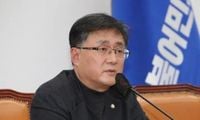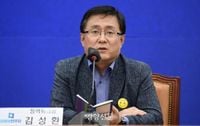On June 23, 2025, Kim Seong-hwan, a seasoned three-term lawmaker from the Democratic Party, was nominated as the first Minister of Environment under President Lee Jae-myung’s administration. This nomination marks the return of a politically-affiliated Environment Minister after a three-year hiatus, signaling a renewed focus on integrating environmental and energy policies at the highest levels of government.
Kim Seong-hwan’s career is distinguished by a deep commitment to climate and energy issues, reflected in his legislative leadership and his pivotal role in shaping President Lee’s climate and energy platform. With a background spanning local and national politics, including key roles such as the Democratic Party’s Policy Committee Chairman and co-head of Lee Jae-myung’s presidential campaign policy division, Kim is widely regarded as an expert in pro-environment energy legislation.
Born in Yeosu, Jeollanam-do, in 1965, Kim graduated from Yonsei University Law School and earned a master’s degree in Public Administration from the same institution. His political journey began in 1995 as a Nowon-gu council member, followed by a seat on the Seoul City Council in 1998. He served as Presidential Secretary for Policy Coordination during the Roh Moo-hyun administration and held the mayoralty of Seoul’s Nowon district for two terms before entering the National Assembly in 2018 via a by-election. Since then, he has secured re-election twice, serving in the 20th, 21st, and 22nd National Assemblies.
Throughout his legislative career, Kim has been deeply involved in committees related to industry, trade, energy, small and medium enterprises, and startups. His participation in the National Assembly’s Special Committee on Climate Crisis and the Climate Crisis Carbon Neutral Economy Forum underscores his ongoing engagement with environmental challenges.
Kim’s legislative portfolio boasts significant achievements, including the introduction and passage of the so-called “3 Renewable Energy Laws.” These include the Renewable Energy Separation Act, the Green Hydrogen Support Act, and the Electric Vehicle Two-Way Charging Obligation Act. Notably, the amendment to the Act on the Promotion of Development, Use, and Supply of New and Renewable Energy raised the Renewable Portfolio Standard (RPS) cap from 10% to 25%, substantially broadening the scope for renewable energy development in South Korea.
He also played a crucial role in enabling Vehicle-to-Grid (V2G) technology through amendments promoting environmentally friendly vehicles’ integration with the power grid, a next-generation innovation essential for managing renewable energy’s intermittency. Additionally, Kim championed the Special Act on the Management of High-Level Radioactive Waste, addressing the safe handling of nuclear waste—a critical environmental and public health concern.
His legislative efforts extend to supporting agricultural solar power projects, promoting decentralized energy systems, and advancing hydrogen economy and safety regulations. These initiatives collectively signal a comprehensive approach to transforming South Korea’s energy landscape toward sustainability and carbon neutrality.
In a recent forum hosted by the Democratic Party’s Carbon Neutrality Committee and Energy Transition Forum, Kim highlighted the urgency of accelerating the nation’s energy transition. He pointed out the paradox that while South Korea has set an ambitious carbon neutrality target for 2050—ten years ahead of China’s 2060 goal—the country’s pace of electrification and decarbonization lags behind its neighbor. “China, whose target for carbon neutrality is 2060, ten years later than ours, is converting to electrification at a much faster pace than us,” he remarked. “However, it is a contradictory situation in the early days of the Lee Jae-myung government that the target is ten years earlier, but actual actions are twenty years later.”
Kim’s nomination comes amid discussions about a major government reorganization to establish a new Climate and Energy Ministry. This proposed ministry would merge the energy sector of the Ministry of Trade, Industry and Energy with the climate and carbon neutrality functions of the Ministry of Environment, or potentially reorganize one of these ministries entirely. The National Planning Committee’s Government Organization Reorganization Task Force is expected to finalize these plans soon.
When asked about the relationship between the new Climate and Energy Ministry and the existing Ministry of Environment, Kim emphasized that “actively responding to climate is far more important than government organizational restructuring.” He added, “The answer to how to organize is not yet decided. It is being discussed in the National Planning Committee. I have just received the nomination, so I will consult well with the Presidential Office, National Assembly, and party officials to find the optimal plan.”
The Presidential Office praised Kim as a lawmaker who “has continuously contemplated future environmental issues” and “understands the President’s awareness that ‘climate crisis is a crisis of survival for all.’” They expressed confidence that Kim’s legislative experience will enable him to “actively respond to environmental issues.”
Kim’s career reflects a blend of political acumen and technical expertise, making him a fitting choice to lead South Korea’s environmental agenda during a critical period. His appointment is expected not only to accelerate the country’s renewable energy expansion but also to drive the electrification of heating and transportation sectors, which are vital to achieving the nation’s carbon neutrality goals.
As the government moves forward, Kim is poised to play a central role in shaping South Korea’s environmental future. His leadership will be crucial in finalizing the 2035 National Greenhouse Gas Reduction Target (NDC) in collaboration with industry stakeholders and in steering the organizational restructuring necessary to establish the Climate and Energy Ministry.
With his nomination now subject to parliamentary confirmation hearings, anticipated in July 2025, all eyes will be on Kim Seong-hwan as he prepares to take on the heavy responsibility of guiding South Korea through one of the most urgent challenges of our time: the climate crisis and the transition to a sustainable, green civilization.


